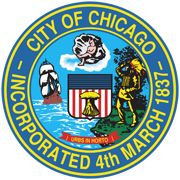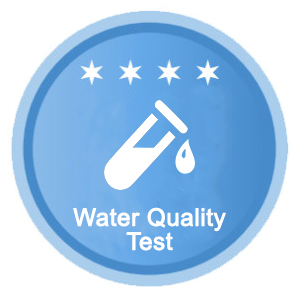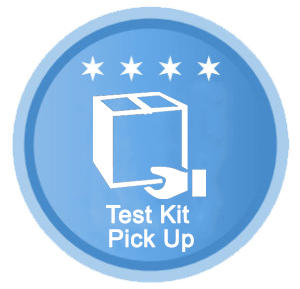Department of Water Management
The Department of Water Management (DWM) delivers nearly 1 billion gallons of drinking water to residents of Chicago and 125 suburbs every day. They also remove wastewater and storm runoff through the sewer system. Their mission is to efficiently provide the highest quality drinking water to the Chicago region while protecting our most precious natural resource- Lake Michigan. DWM’s primary responsibility is to maintain the integrity of the water and sewer systems within the overall distribution system. This includes over 47,000 fire hydrants, 48,000 water control valves, 56,000 sewer structures and a combined total of over 9,000 miles of water and sewer mains.
Water Quality
If you are concerned about the potential of elevated lead levels in your home’s water, you may wish to have your water tested. The test kit consists of three bottles, a mailing box, and instructions. Follow the instructions included in your kit for collecting water samples in your home, put the bottles in the shipping box and place it in a location (such as the entryway or front door) for pick up by Department of Water Management (DWM) staff. If you would prefer to schedule a time for a DWM representative to come to your home to take water samples, keep in mind that this appointment must be scheduled for a time when you are home and you have not used your water for over 6 hours. Please call 311 or fill out the form below and a representative will reach out to you to schedule a visit.
Online Water/Sewer Bill Pay
Water Supply/Distribution
The Chicago Water System provides potable water to the City and more than 100 suburban communities, approximately 5.4 million people.
Raw water enters the crib about 2-miles out in the lake and is sent to one of two purification plants where the water is treated and impurities removed. The water then flows by gravity to 12 pumping stations strategically located throughout Chicago. At the pumping stations the water is elevated to the grid mains and pressurized. This allows the water to be delivered to homes and business throughout Chicago.
DWM laboratories test for water quality 24-hours a day 365-days a year. Water supplied by the Department of Water Management exceeds existing and proposed water quality standards established by the United States Environmental Protection Agency and the Illinois Pollution Control Board.
Should you have any question or concerns about the quality of your tap water you may contact our Water Quality Surveillance Section at: 312.744.8190.
Meter Save Program
MeterSave is a FREE program offered by the City of Chicago Department of Water Management (DWM) to non-metered Chicago homeowners to voluntarily install meters to help them save water and save money. Homeowners participating in MeterSave will be eligible for a 7-year guarantee that the home water bill will be no higher than it would have if the meter had not been installed. Upon installation of the meter, and while supplies last, homeowners will be eligible for the following FREE additional incentives:
- An outdoor water conservation kit
- A hose timer
- Rain gauge
- Water restricting hose nozzle
- Moisture sensor
- An indoor water conservation kit, or low flow shower head
- A shower timer
- Toilet flapper
- Leak Detection Tablets
- Toilet tank bank–a toilet tank water displacement pouch
- 4-quart fill cycle diverter that helps save water after flushing the toilet
- Swivel low-flow kitchen aerator
- Two bathroom sink aerators
- Teflon tape
- Water Conservation wheel
Sewer Cleaning
Sewer structures (i.e., catch basins) full of dirt or debris, or sewer structures that are not draining properly, can be reported for cleaning. Pertinent information to report includes the approximate address and the location (i.e., near the curb, in the street, or in the alley) of the catch basin.
Cleaning of catch basins on private property is the responsibility of the property owner. The Department of Water Management follows a cleaning and maintenance schedule for all sewer structures in the City of Chicago.
Slowing the Flow
Chicago initiated its inlet control valve system (called the “Rain-blocker” program) as one facet of a multi-dimension concept.  When the restrictor valve is installed in the storm water catch basin, the device, in essence, shrinks the pipe to funnel and regulate the water from the street to the main sewer line. During a heavy rain event, the smaller opening allows less water into the sewer system. The streets act as a temporary holding area for the rainfall. Surplus water in the system will not be forcing contaminated water back through homeowners’ private lines and into the home’s lowest spot – the basement. The street ponding buys time for the system to catch up. READ MORE
When the restrictor valve is installed in the storm water catch basin, the device, in essence, shrinks the pipe to funnel and regulate the water from the street to the main sewer line. During a heavy rain event, the smaller opening allows less water into the sewer system. The streets act as a temporary holding area for the rainfall. Surplus water in the system will not be forcing contaminated water back through homeowners’ private lines and into the home’s lowest spot – the basement. The street ponding buys time for the system to catch up. READ MORE
Private Drain Repair
The City may now repair sewer drain tiles coming from private residences, in buildings of up to four units, that are broken under the public way. This is the area from the city sidewalk to the center of the street. Tiles proven to be broken under the public way will be repaired by the City at no cost to the property owner when the following conditions are met: A licensed sewer contractor must be hired to rod and/or make a video inspection of the drain line, and the contractor must schedule a review by a sewer inspector. The Department of Water Management oversees the Private Drain Program.
Supporting Documents/Information
- Private Drains or sewer lines (up to 6-inches) are inspected by the Drain Inspectors: 312.744.5503.
- Large private sewer structures 8-inches and larger are inspected by the Mason Inspectors contractors can call: 312.744.5502.
- Sewer Permit Section Telephone: 312.744.3155 or 312.744.3351
- Stormwater Review Telephone: 312.744.3351
- 2016 Storm Water Manual
- 2016 Stormwater Regulations
- OutletCapacityMaps
- File a Water Management FOIA Request
- Flushing Your Service Line after being Connected to New Water Main
- EPA – Ground Water and Drinking Water
- Water Quality Results and Reports
- Chromium-6
- LMO – 2 Reports
- Flushing Your Water System
- Water Management Announces Plan to Explore Lead Service Line Replacement
- Chicago Water Quality – Lead Plans







